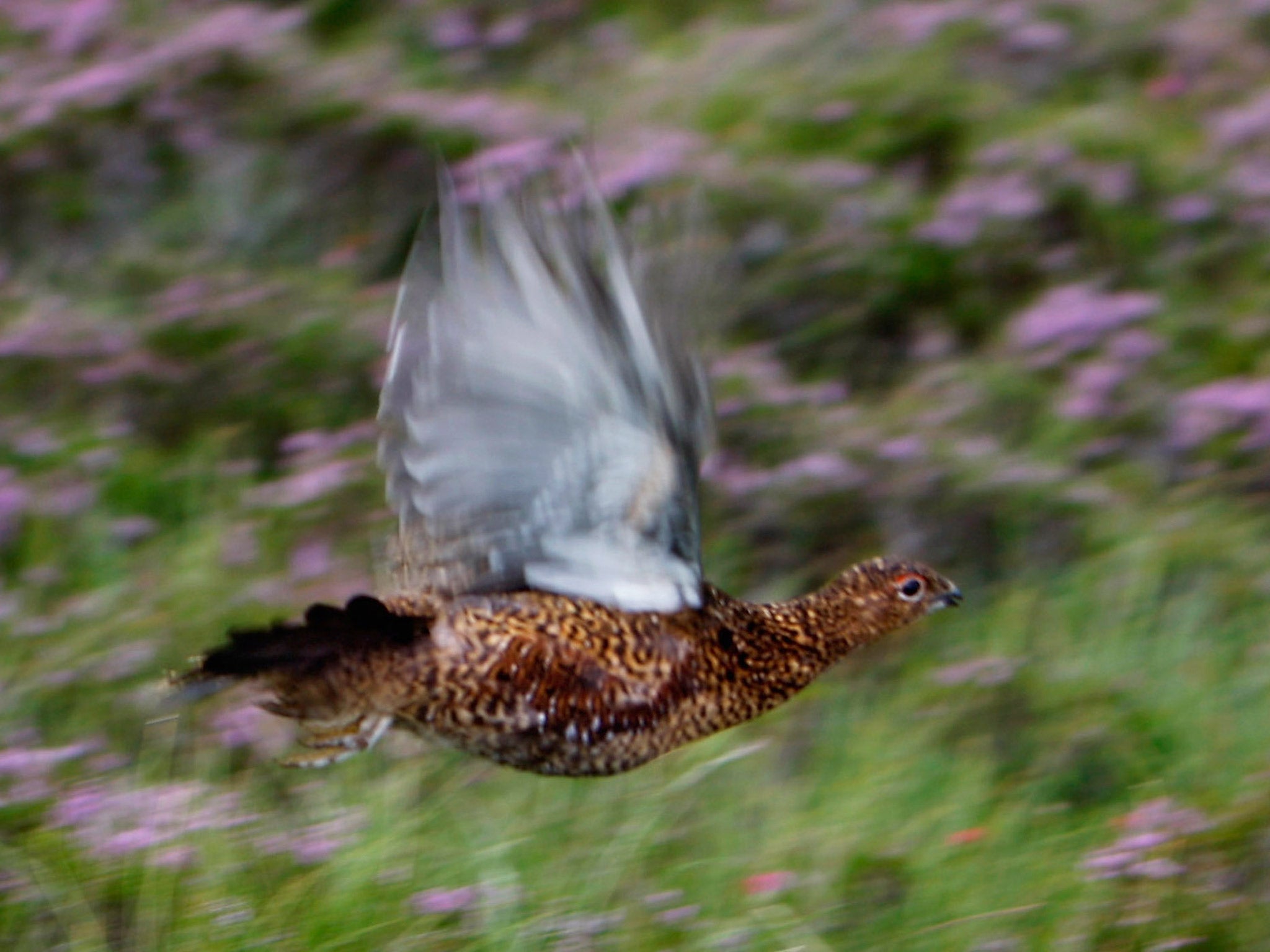Glorious Twelfth: Upcoming grouse hunt in peril as bad weather decimates bird numbers
Illegal kills by game-keepers to protect grouse for shoots and fears for jobs cloud idyllic scene

It was a picture of traditional Scottish country life. Across the rolling, heather-strewnmoorland shots rang out as the Glorious Twelfth ushered in the grouse-shooting season.
On one shoot on the Lammermuir Hills, 15 miles south-east of Edinburgh, shooters, gamekeepers, beaters, gunloaders and retrieval dogs were enjoying their first hunt of the year, roaming from one site to another in a procession of four-by-fours and pickup trucks.
Closer inspection, however, showed that things were not quite so idyllic. On a tour with Ian Thomson, head of investigations at RSPB Scotland, we came across a tree trunk that had been laid across a stream with a mesh cage in the middle. The cage contained what looked like a large mousetrap, designed to catch stoats and weasels that prey on grouse and their eggs.
In addition to reducing the population of predators and disease carriers such as foxes, deer, crows and mountain hares – all perfectly legal – some gamekeepers have illegally killed large numbers of hen harriers that prey on their grouse, Mr Thomson said.
It’s an accusation backed up by data. Since 2000, 20 gamekeepers have been found guilty of “raptor persecution” or poisoning offences on grouse moorland – while in 2013 alone the RSPB logged 238 reports of birds of prey being poisoned, shot or beaten to death.
Gamekeepers also burn large swathes of their estates each year to create a mosaic of areas of differently-aged heather, since grouse prefer to eat younger heather and nest in older heather. This is also legal, but the RSPB says too much heather is being burned on peat bogs that are a valuable carbon sink, and that too many bogs are being drained to enlarge the area that can be inhabited by grouse – putting bogland species such as cotton grass and bog asphodel under pressure.
The most controversial animal killings
Show all 6“We are seeing grouse farming in many areas. But having an unnatural density of grouse has an adverse effect on other species,” said Mr Thomson. “We’re not seeing buzzards, or hen harriers or peregrines [falcons] and we should be. It’s wholly artificial.”
The shooting fraternity takes issue with the RSPB’s assertion that their activities are spoiling the countryside and argue that they provide a valuable means of conservation. “We manage the moors so that there are a mix of areas, from freshly burned to four or five years old, providing food and habitat for a wide range of species,” said Duncan Thomas, the North West regional officer for the British Association for Shooting and Conservation.
“If grouse shooting didn’t take place, the moors would grow into a mass of rank heather leaving a sterile wildlife environment. This would pose an enormous uncontrolled fire risk. Moorland management is essential to protect against that fire risk.”
The grouse shooting industry is big business in the uplands of Scotland and northern England, bringing £2bn a year into the rural economy and supporting 100,000 jobs in everything from pubs, restaurants and hotels to gunmaking, gamekeeping and beating the birds out of the heather for the shooters.
But despite the shots filling the Scottish moorland air, this season will be a tough one for the industry after an unusually cold spring decimated grouse populations.
“We’ve had a terrible cold spring which hammered all wildlife in the uplands, especially the wild grouse chicks,” Mr Thomas said. “A significant amount of income is generated by rural economies through grouse shooting but this season many restaurants, pubs, hotels will suffer from lost bookings. We’re talking about hundreds of thousands of pounds in lost revenue. There is disappointment and frustration.” Some local communities will be badly hit. “At one village near here – Abbeystead, in between Clitheroe and Lancaster – half of the kids at the school are gamekeepers’ children,” said Mr Thomas.
Phil Gunning, a retired police inspector who runs a grouse syndicate on the Bowland Estate in Lancashire, was resigned: “Whatever we do in terms of upland management, using all the science at our disposal, nature is invariably on hand to remind us just who holds the upper hand,” he said.
Subscribe to Independent Premium to bookmark this article
Want to bookmark your favourite articles and stories to read or reference later? Start your Independent Premium subscription today.

Join our commenting forum
Join thought-provoking conversations, follow other Independent readers and see their replies